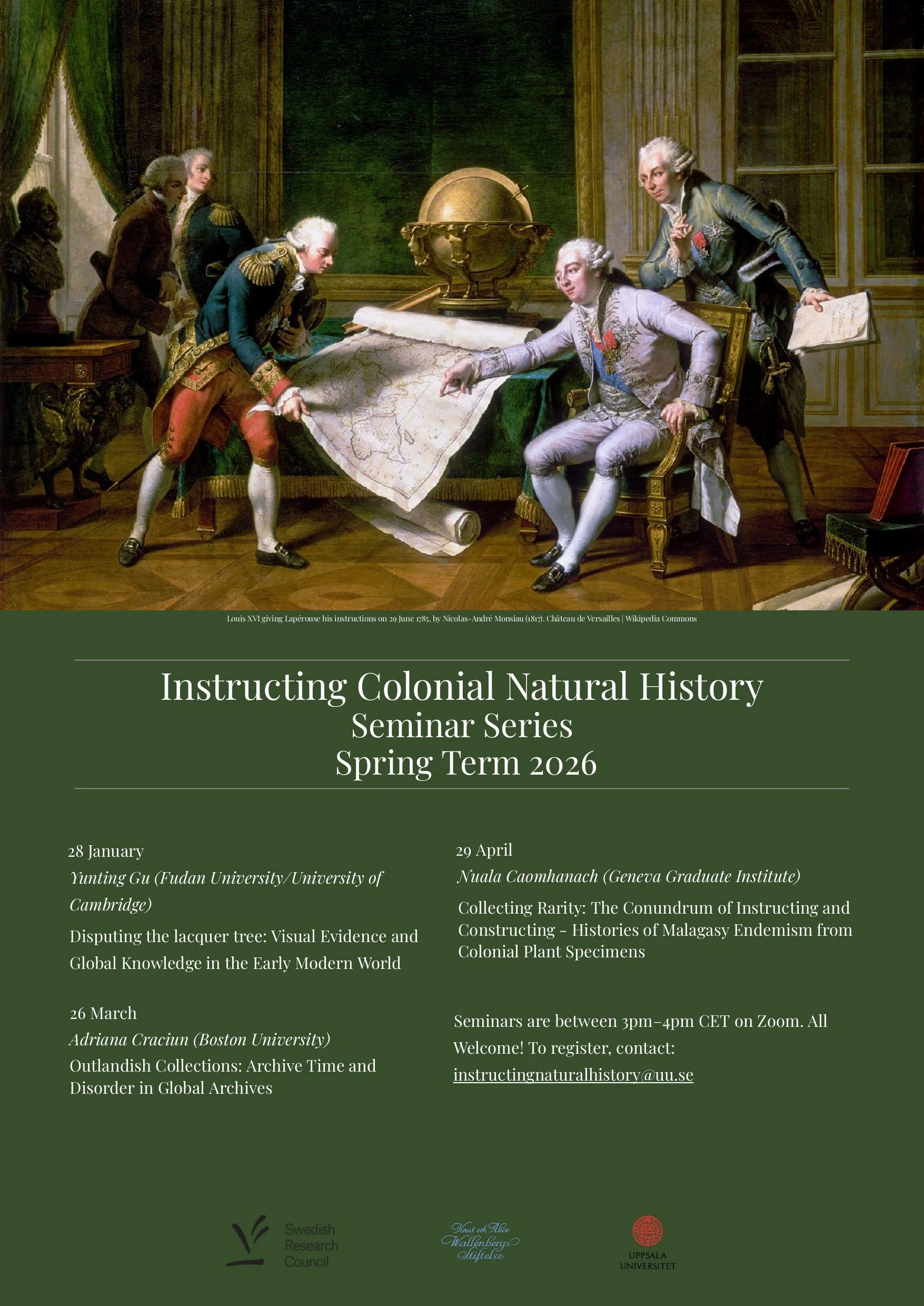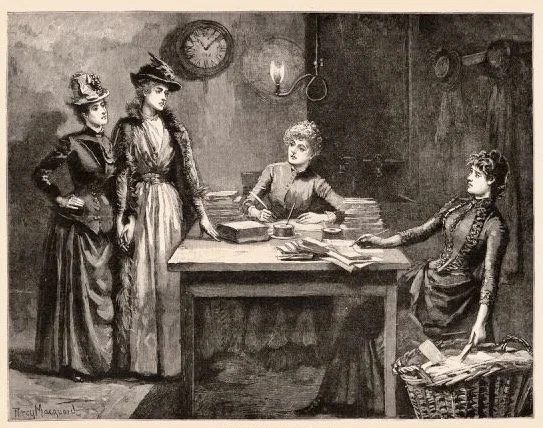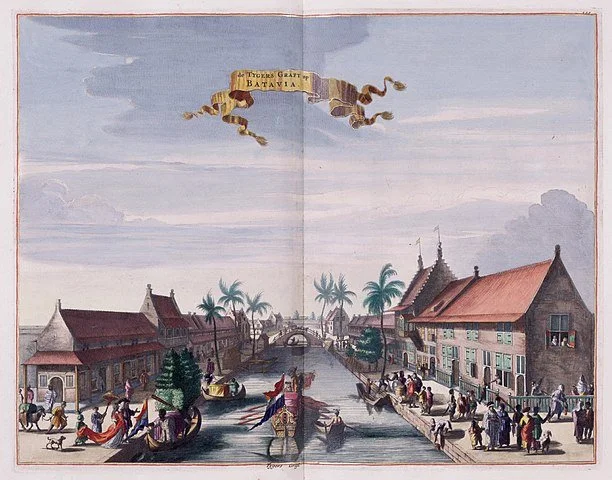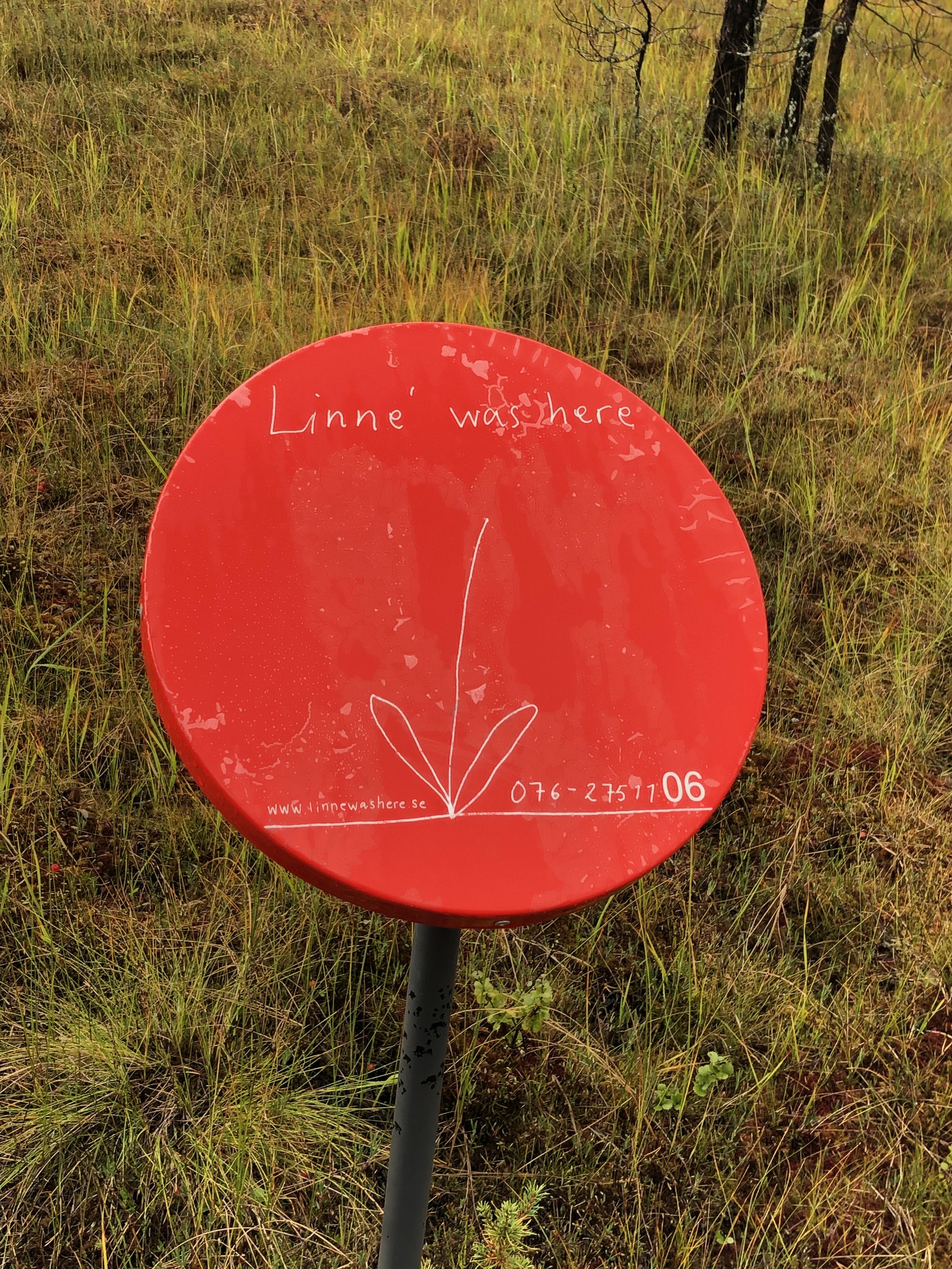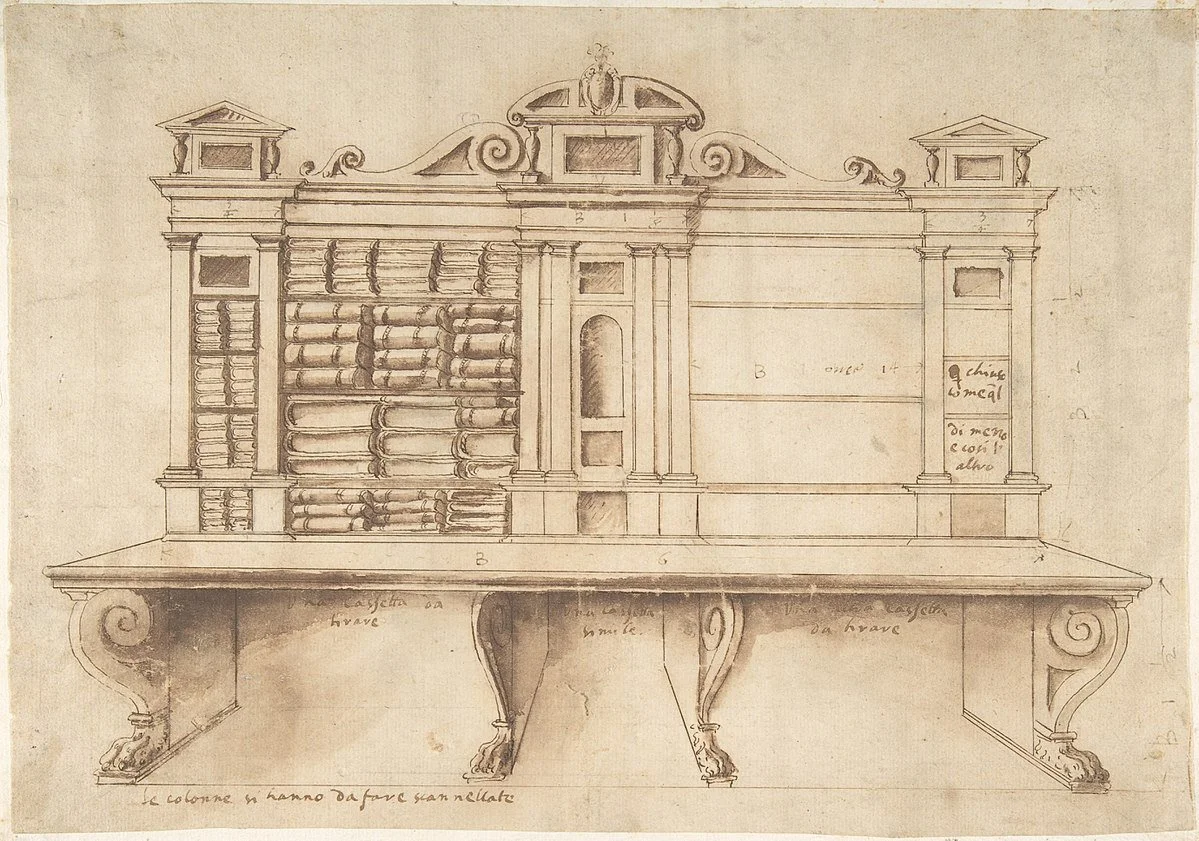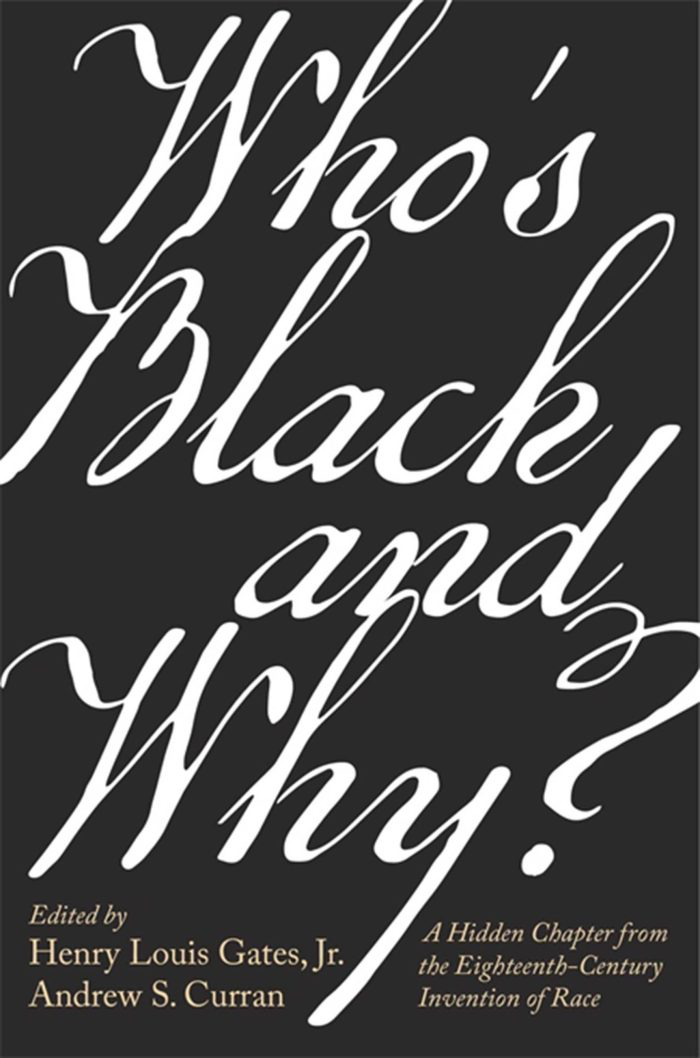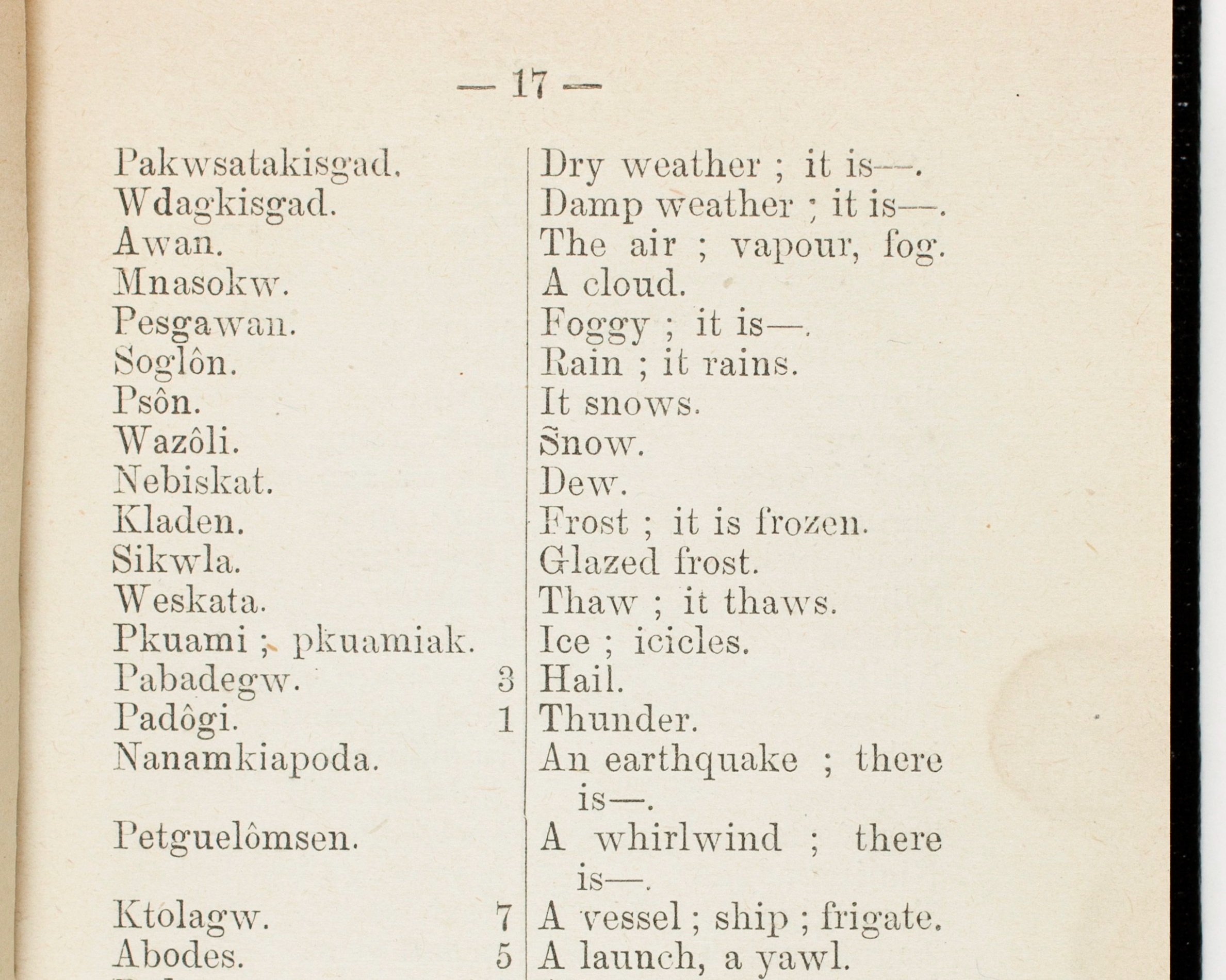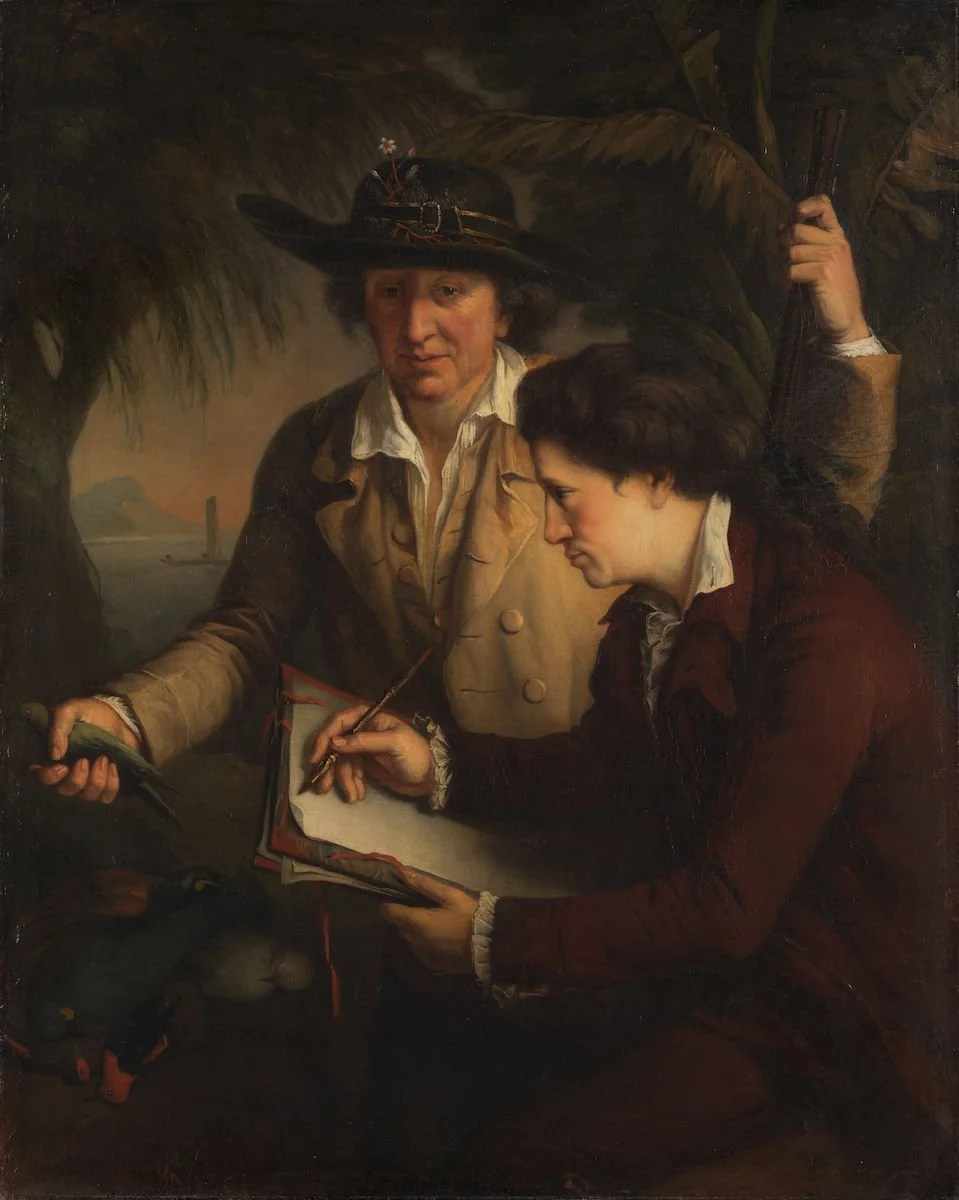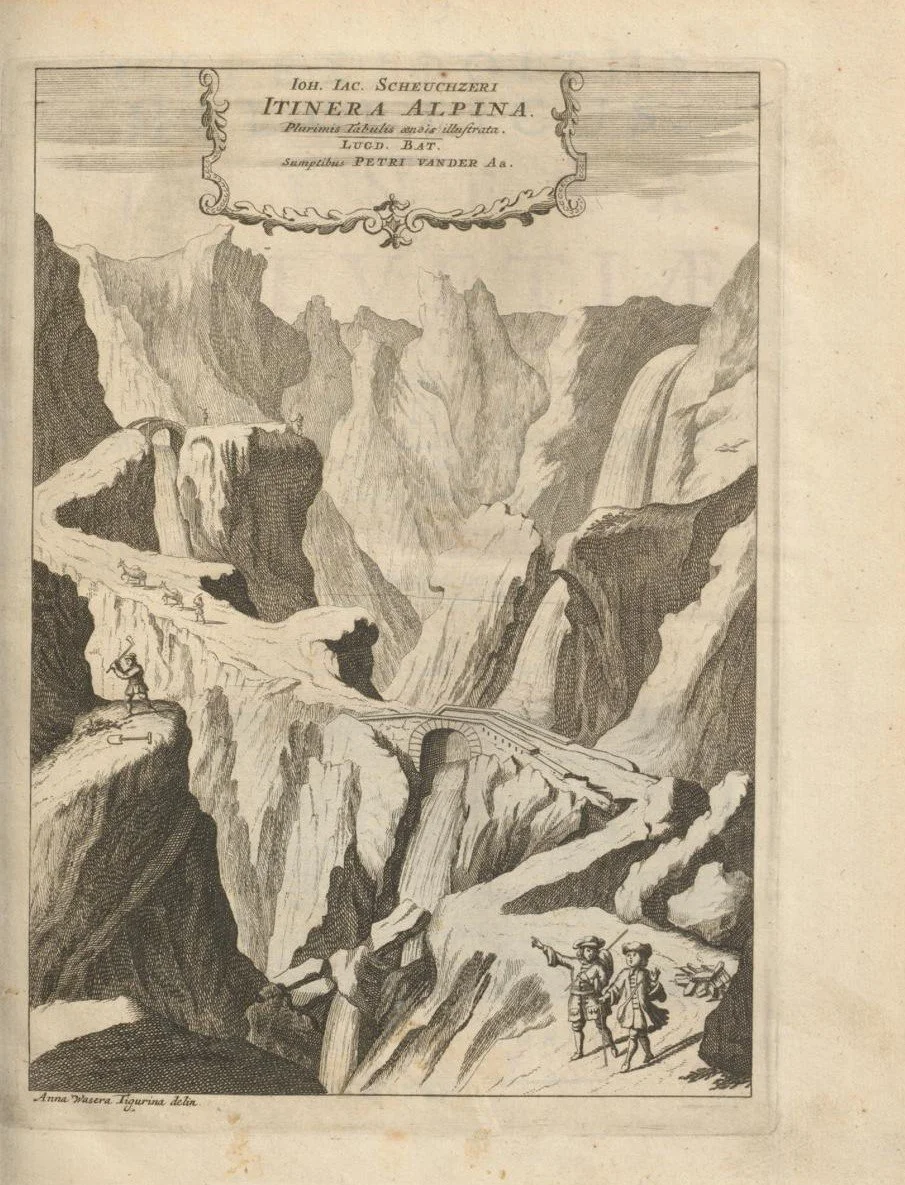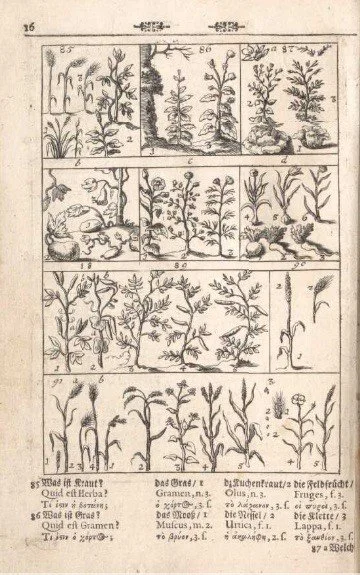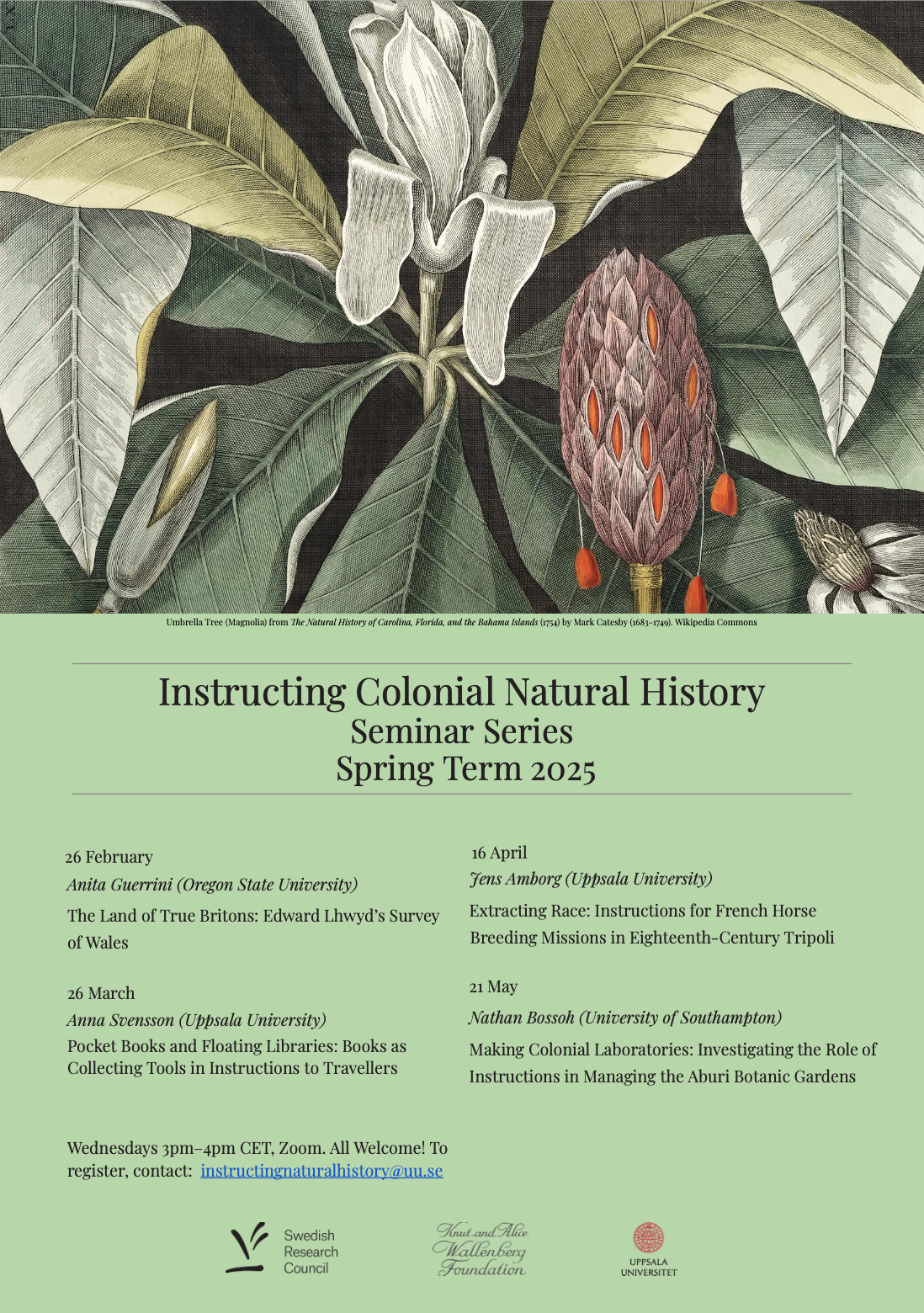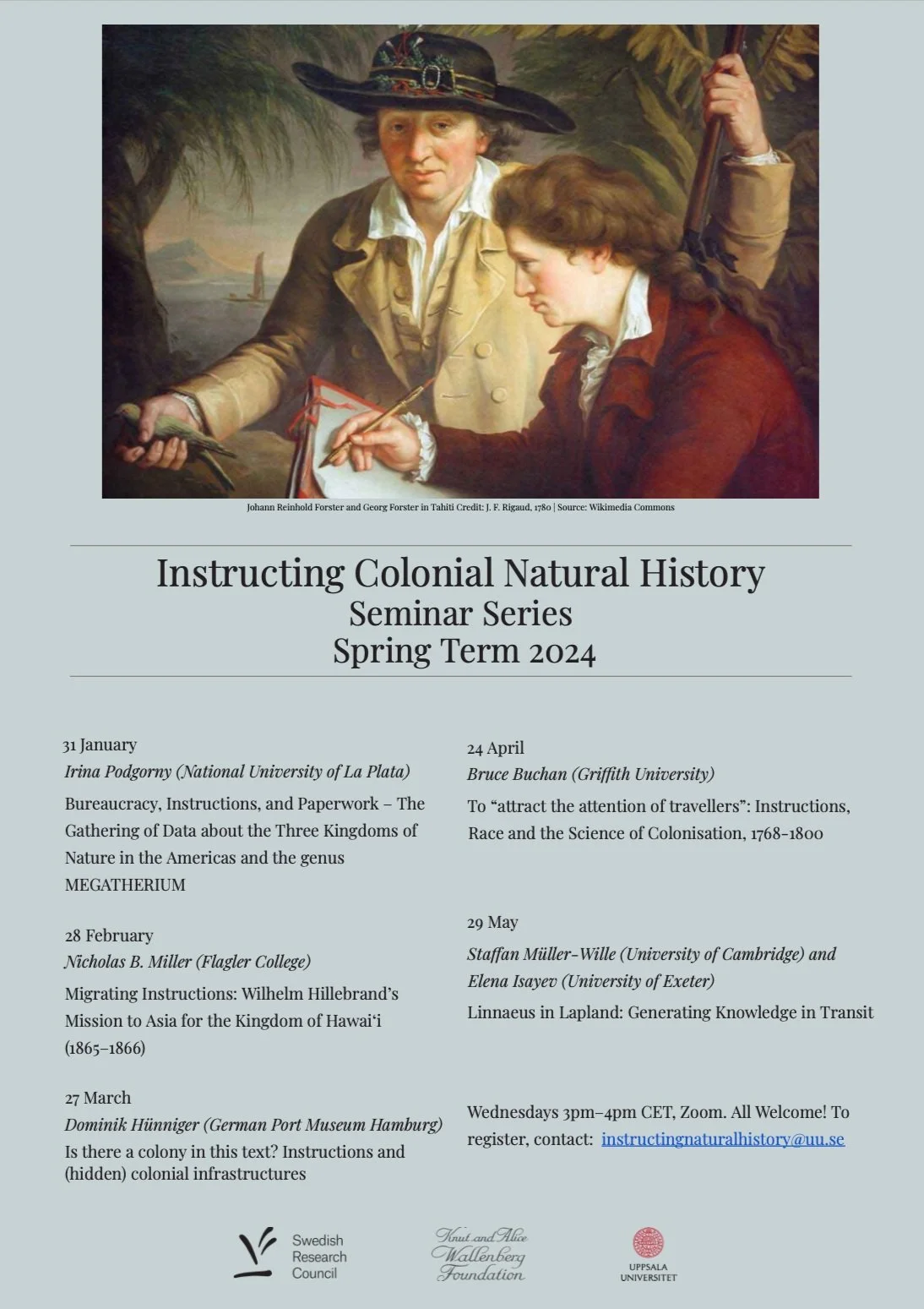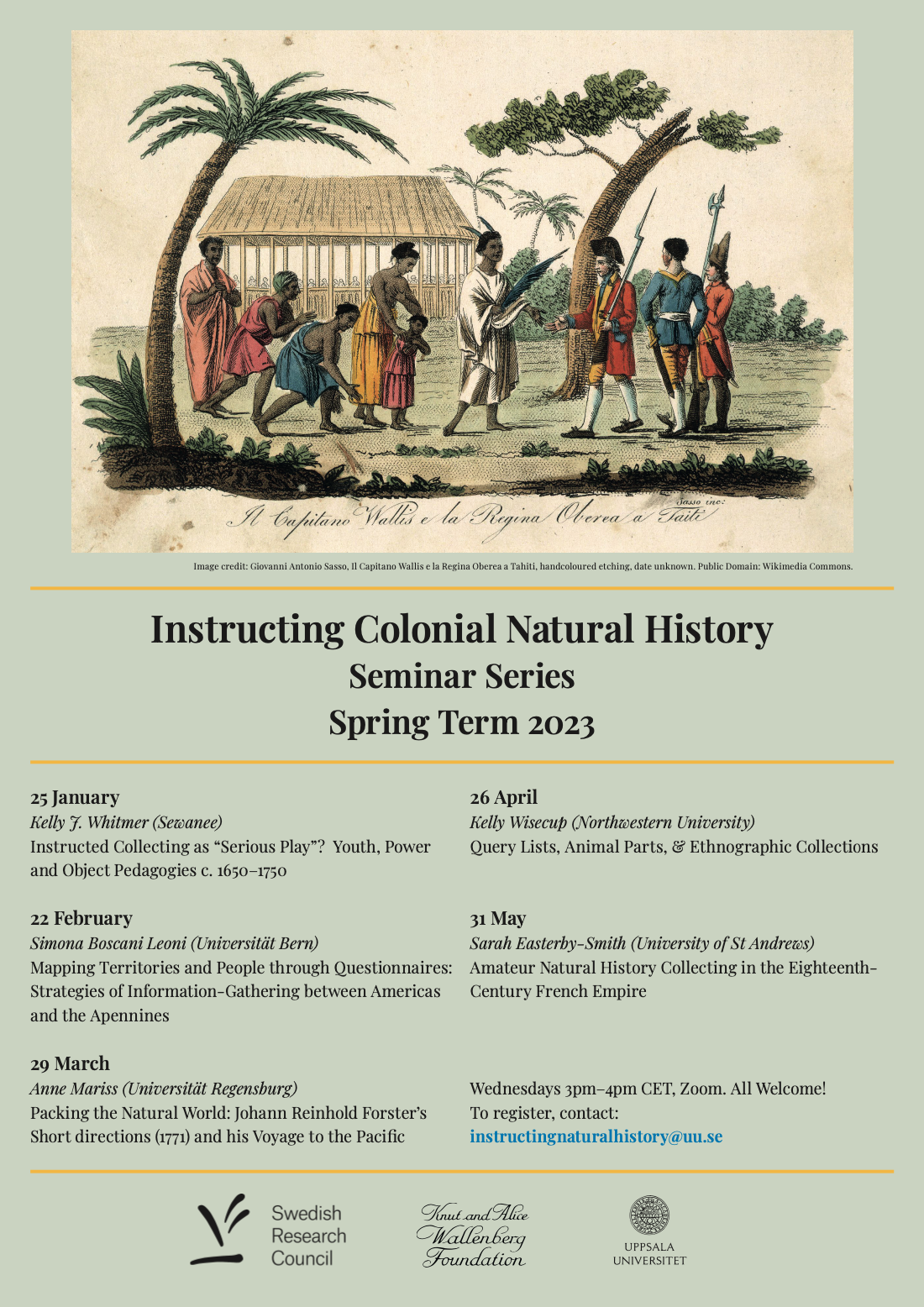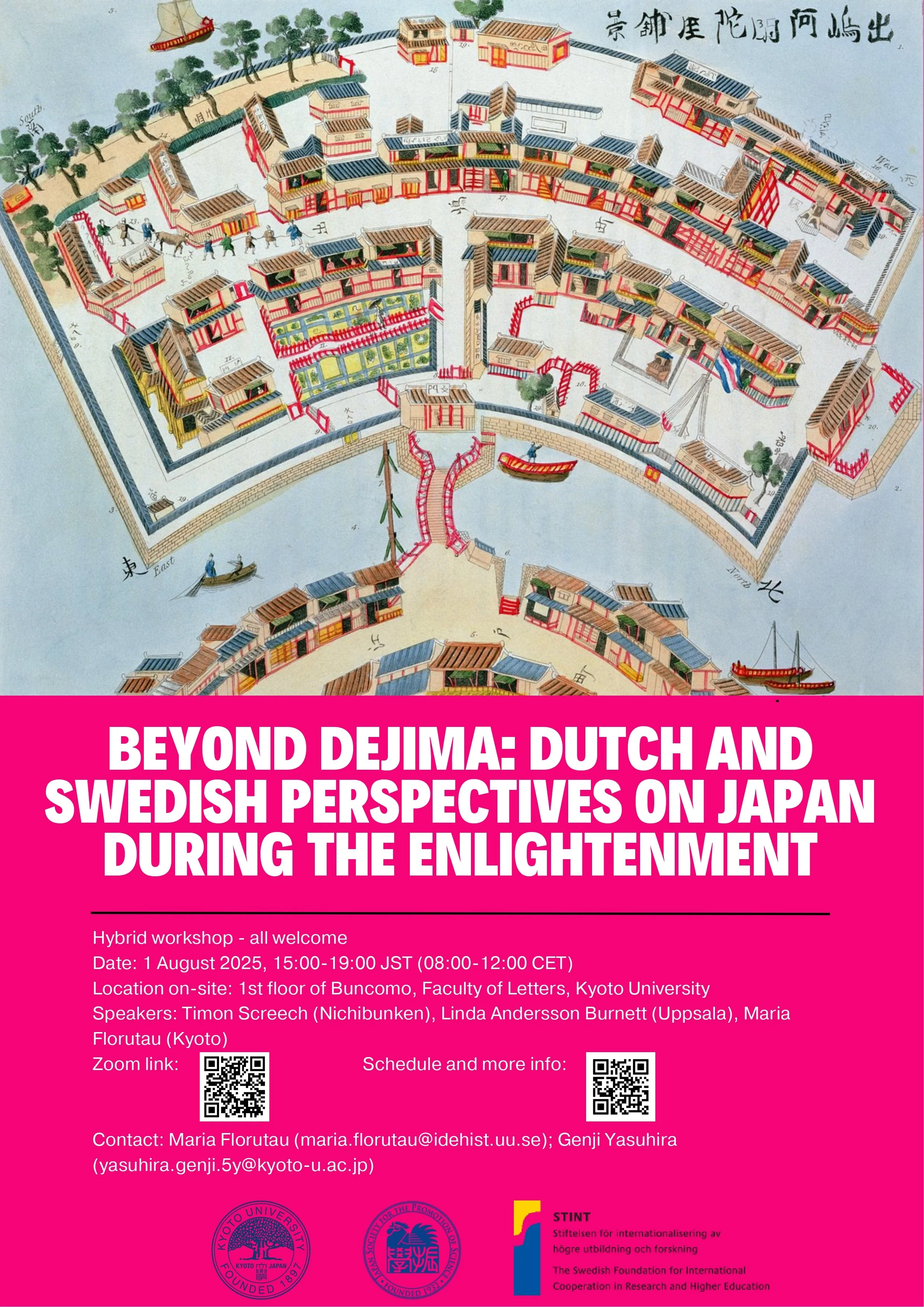Upcoming Events
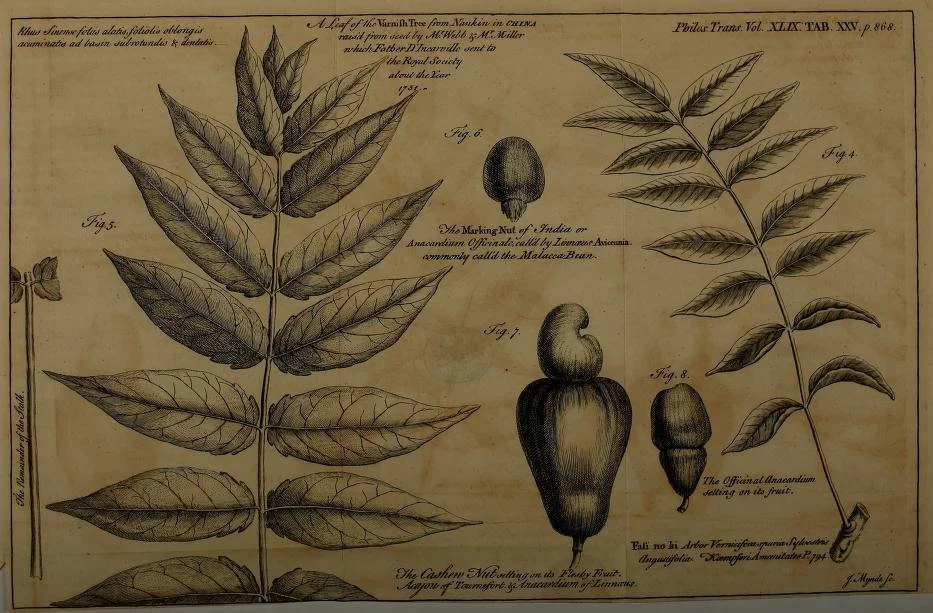
Yunting Gu (Fudan University/University of Cambridge) - Disputing the lacquer tree: Visual Evidence and Global Knowledge in the Early Modern World
This presentation investigates a scientific controversy over the identity of the lacquer (‘varnish’) tree in the 1750s, a dispute that linked Asia, Europe, and North America through the circulation of texts, images, and specimens. Since lacquer was a prized commodity exported from China and Japan, European naturalists debated whether it could be cultivated in colonial America to reduce dependence on Asian imports.
At the heart of this controversy lay not only economic ambitions but also fundamental questions about credibility of testimonies, objectivity of images, and authority of early modern institutions in the making of botanical knowledge. The case turns especially on the written and visual instructions issued by figures such as John Ellis to his colleagues in Asia and America for identifying, collecting, and shipping specimens–working methods that both enabled and constrained transregional knowledge-making.
This presentation takes the writings and correspondence of John Ellis, Philip Miller, Carl Linnaeus and their informants in America and China as a central case study. By tracing this debate, the presentation addresses three wider questions. First, how were forms of evidence (visual, textual, and material) weighed and contested in eighteenth-century science? Second, how did knowledge from Asia—whether transmitted via Jesuit networks, VOC officials like Rumphius, or Kaempfer’s Japanese materials—intersect with European taxonomic systems? Third, how did these debates reflect the entangled relations among individual naturalists, the Royal Society, and the Philosophical Transactions in the making of knowledge, considering especially that this journal was just formally taken over by the Society in 1752?
Yunting Gu is a PhD candidate in the National Institute for Advanced Humanistic Studies and Department of History at Fudan University, Shanghai. Her research interests include history of early modern science, Dutch colonial history and Southeast Asian history, with a particular focus on recovering marginalised voices and reconstructing the multi-sited labour that shaped scientific and medical knowledge. She has been a visiting scholar at EHESS-CAK with funding from the French Embassy in China, and is currently a visiting PhD student at the Department of History and Philosophy of Science at the University of Cambridge. Her dissertation examines the Maluku Islands through the combined lenses of history of science and labour history, exploring how global knowledge was produced through local work, expertise, and cross-cultural encounters.
For the Zoom link, please email instructingnaturalhistory@uu.se
Image: John Ellis, Philosophical Transactions (1755-1756) vol 49, p. 868
Anna Svensson: Pocket Books and Floating Libraries: Books as Collecting Tools in Instructions to Travelers
Books have been essential to the conception and pursuit of collecting at a global scale since the early modern period. This is evident in the rich and growing body of scholarship exploring the versatility of paper technologies, chains of reference, (im)mutable mobiles and, not least, correspondence networks. Although this is relevant for the collection of any organism or object, the role of books as collecting tools is uniquely relevant to the collection of plants. Instructions to travellers, in print and manuscript, to collect plants in books, match both archival references to the practice and the widespread occurrence of pressed plants in early modern books. These instructions also echo early instructions of how to make a herbarium. This talk teases out the different meanings and uses of ’book’ in relation to interconnected historical collecting practices and formats (the herbarium/hortus siccus, inter-referencing, interfoliation, etc.), seeking to bring some clarity to their place in current historiographical discussions.
Anna Svensson is an affiliated researcher at the Department of History of Science and Ideas at Uppsala University. With a focus on materiality and practice, her research explores different perspectives on the history and present of botanical collections, most recently how pressed plants in early printed books relate to the hortus siccus. She is currently employed at the Botanical Department of the Natural History Museum, Stockholm, to work with the historical and miscellaneous collections.
For the Zoom link, please email instructingnaturalhistory@uu.se
Image: author’s own
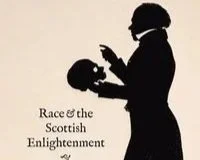
Linda Andersson Burnett and Bruce Buchan - Book Launch - Race and the Scottish Enlightenment: A Colonial History, 1750-1820
How colonialism shaped the Scottish Enlightenment’s conception of race and humanity
In the decades after 1750, an increasing number of former medical students from the University of Edinburgh construed humanity as a subject of both intellectual curiosity and colonial interest. They drew on a shared educational background, blending medicine with natural history and moral philosophy, in a range of encounters with non-European and Indigenous peoples across the globe whom they began to classify as races. Focusing on a surprising number of these understudied students, this book reveals the gradual predominance of race in Scottish Enlightenment thought.
Teaching provided a toolbox of concepts and theories for students who went on to careers as military and naval surgeons, colonial administrators, and natural historians. While some, such as Mungo Park—who traveled in Africa—are well known, many others such as the long-term residents in the Russian Empire, Matthew Guthrie and his wife, Maria Guthrie, or the Caribbean botanist Alexander Anderson are less remembered. Among this group were those such as the Pacific traveler Archibald Menzies and the circumnavigator of Australia, Robert Brown, who are known primarily as botanists rather than as ethnographers. Together they formed a global network of colonial travelers and natural historians sharing a common educational background and a growing interest in race.
We will also outline our next project which is entitled Science by Instruction: Humanity, Natural History, and Colonisation 1750-1850. Our next book will explain why and how a global trade in skulls and body parts became part of a pan-European and American scientific practice.
Linda Andersson Burnett is a Senior Lecturer and Wallenberg Academy Fellow in the Department of History of Science and Ideas at Uppsala University. She is the principal investigator of the Instructing Natural History: Nature, People, Empire programme and convenes three externally-funded projects: Early Citizen Science, Women Collectors of Natural History and together with Bruce Buchan Collecting Humanity. Andersson Burnett is a member of the Swedish Young Academy and holds a PhD in History from the University of Edinburgh. She has published numerous articles on colonial science, natural history travel, ethnographic studies and collecting, and has co-edited special issues of Scandinavian Studies (91:1-2, 2019), History of the Human Sciences (32:4, 2019), Global Intellectual History (8:4, 2023) and The British Journal for the History of Science (Forthcoming, 2026).
Bruce Buchan is a Professor in the School of Humanities, Languages, and Social Science at Griffith University. His research traces histories of European ideas, focussing on the era of Scotland’s Enlightenment. In recent years he has been awarded visiting appointments at the University of Copenhagen (2016) and the École des hautes études en sciences sociales (2017), was named a Fernand Braudel Fellow at the European University Institute (2020), and awarded a visiting fellowship at the Swedish Collegium for Advanced Studies (2024). His publications include: Empire of Political Thought: Indigenous Australians and the Language of Colonial Government (2008), An Intellectual History of Political Corruption (with Lisa Hill, 2014), and the co-edited volumes: Sound, Space, and Civility in the British World, 1700-1850 (2019), and Piracy in World History (2021).
For the Zoom link, please email us on instructingnaturalhistory@uu.se

Stefano Gulizia: Dispatching Authority: Sovereignty and Natural Encounters with Spanish American Science
How did administrators and priests harness indigenous knowledge? What was the use of instructions vis-à-vis military instruction? Were antiquities included in a broad definition of natural history? And what was the style of a ‘thick’ environmental description? This paper displays these questions, against the background of Spanish America, and with a special concern for religious culture, as seen in the coordination of Jesuit dispatches but also in what has been termed the written empire of Franciscan missionaries. The first part briefly surveys the use of questionnaires, from 16th-century Inquisition memorials to Spanish-crown empirical inquiries; following this, comes another brief section that moves to a later period, by comparing Linnaean expeditions—seen here not in their relation with mercantilism and national discourses of improvement, but as a legacy of physico-theology and Baconian impartiality—with the Ramist methodization of travel. Against this new assessment, the greater part of the paper discusses some texts produced at the intersection of criollo reports and Bourbon centralization in Seville at the Council of the Indies. These texts include Gregorio García’s 1607 Origen de los Indios, Sigüenza y Góngora’s 1693 report on Santa María de Galve, and Luis Diez Navarro’s 1758 surveying of Honduras. The conclusions foreground ideas on geology and biodiversity, and explain what it means for sovereignty to be configured as a network of natural historical knowledge.

Writing Science in the Nineteenth Century: British Women’s Correspondence Networks - CNRS International Emerging Actions WOMNH 19
British women played a significant role in scientific networks during the nineteenth century, particularly through their correspondence with male scientists in Britain and abroad. These networks allowed women to benefit from the advice and guidance of male scientists at a time when formal scientific education and access to universities and scientific societies were often closed to them. Many women also shared their discoveries, practices, and observations through private letters, which sometimes serve as the only record of their scientific contributions. This symposium aims to explore the role of women’s correspondence networks in the production of scientific knowledge during the nineteenth century. It will emphasise the importance of these often-overlooked archives in reconstructing women’s scientific labour, while also examining the discursive strategies women employed, such as the cultivation of values like moderation, modesty, and humility—qualities that became increasingly associated with women throughout the century.
WOMNH-19 (2024–2025) is a two-year CNRS International Emerging Actions (IEA) research project conjointly led by Prof. Laurence Talairach (Alexandre-Koyré Centre/University Toulouse Jean Jaurès) and Associate Prof. Linda Andersson Burnett (Uppsala University, Sweden). It aims to re-evaluate nineteenth-century British women’s contributions to natural history. By shedding more light on the place of women in some scientific fields, redefining lay and professional practices and foregrounding women’s contribution to the construction of scientific knowledge, WOMNH-19 seeks to understand better the construction of a scientific ‘culture’ and define its scholarly legitimacy.
For more information, please see: https://womnh.hypotheses.org/events

Nathan Bossoh (Southampton University) - Making Colonial Laboratories: Investigating the Role of Suggestions and Instructions in Managing the Aburi Botanic Gardens
In his 1887 publication Sketch of the Forestry of West Africa, Cornelius Alfred Moloney, British Governor of the Lagos Colony, provided “suggestions” for the development of a network of botanic gardens across the newly acquired West African territories. Over the next twenty years five botanical gardens were established across these very territories. Until the end of the nineteenth century systematic knowledge of West African botany remained largely elusive. Most British botanizing opportunities in the region up until then had mostly been a part of wider geographical, missionary, or military expeditions. The rise of the West African botanic gardens coincided with British formal control of the African coastal region. This period also saw the emergence of the Kew Botanic Gardens Bulletin of Miscellaneous Information which served as an ‘occasional publication’ for communicating botanical correspondence across the Empire. Focusing my talk on the second of the five established gardens in West Africa, I explore the role of ‘suggestions’ and ‘instructions’ in the shaping and early management of the Aburi Botanic Gardens, Gold Coast. I argue that, as an experimental laboratory, the early success of the Aburi Botanic Garden played a key role in plans to permanently expand botanic stations across West Africa. Colonial “successes” however, did not come without its failures.
Nathan Bossoh completed his PhD in History and Philosophy of Science at UCL in 2022 and his main research situates around the intersections of science, medicine and African collections. Currently he is a History Research Fellow at Southampton University. There he is undertaking a project examining the growth of plant medicine research in colonial and post-colonial Ghana with a focus on the circulation of botanical knowledge between the eighteenth and twentieth centuries. Nathan is the co-curator of The Kola Nut Cannot Be Contained, an exhibition held at Wellcome Collection, London between July 2024 and February 2025 which explored the global histories, vibrant traditions, and contemporary innovations surrounding the Kola nut, a small bitter-tasting fruit found growing across Western African tropical forests.
To register, please email instructingnaturalhistory@uu.se
Jens Amborg (Uppsala University) - Extracting Race: Instructions for French Horse Breeding Missions in Eighteenth-Century Tripoli
This paper examines French instructions for how to acquire, import and acclimatize breeding stallions from North Africa in the eighteenth century. The French royal institution for horse breeding, the Haras Royaux, was created in 1665 with the objective of ‘perfecting the race’ of the domestic horse stock, which was perceived to be hopelessly degenerated. The Haras mainly sought to improve the French horses by importing superior foreign stallions, of which the most prestigious were the Arabian and Barb ones. This paper focuses on a series of instructions written by the Haras administration around 1750, outlining its plans for creating a permanent establishment in Tripoli (present-day Libya). From the perspective of ‘history of projects’, I follow how the instructions for the Tripoli establishment were drafted in several steps; from choosing its location to giving detailed guidance to the horsemen who were sent on the mission. The paper explores how the Haras’ activities tied into France's imperial ambitions, including how the instructions stressed that the extraction of North African stallions – intended to serve as resources for ‘racial improvement’ – would bolster their commercial and military power. It argues that instructions can be understood as a key technology in the complex relationship between metropolitan ambitions, knowledge and ignorance, on the one hand, and overseas sites of extraction, on the other, in histories of imperial science. It furthermore underscores how the transnational transfer of animals and knowledge faced challenges as realities and individuals’ actions on the ground diverged from the metropolitan plans.
Jens Amborg is a PhD candidate in the Department of History of Science and Ideas at Uppsala University. He is interested in the history of science and medicine, environmental and animal history, and the French Enlightenment. His thesis examines theories and practices of animal breeding in eighteenth-century France, particularly focusing on how animal breeding knowledge shaped ideas about race, reproduction and improvement. Jens previously studied at Cambridge University and the EHESS in Paris, and was a visiting researcher at Stanford and Cambridge.
To register, please email instructingnaturalhistory@uu.se
Image credit: Wikipedia Commons
Seminar - Anita Guerrini (Oregon State University): The Land of True Britons: Edward Lhwyd’s Survey of Wales
In 1695, after completing the chapters on Wales for a new edition of Camden’s Britannia, the Welsh naturalist Edward Lhwyd (1660-1709) published A Design of a British Dictionary, Historical and Geographical; With an Essay, Intituled, Archaeologia Britannica: and a Natural History of Wales, outlining a multi-volume project for which he sought patronage. Two years later Lhwyd distributed 4000 copies of ‘Parochial Queries’ for potential informants. Predecessors for such queries included Robert Boyle’s ‘General Heads’, Lhwyd’s mentor Robert Plot, the Scottish physician Robert Sibbald, and queries from the 1650s on Irish resettlement. Lhwyd argued that the Welsh were the indigenous inhabitants of Britain, which had been colonized over time by the Romans and others. The first volume of Archaeologia Britannica (1707) compared Welsh with other Celtic languages to make this case. Lhwyd’s project was one of preservation and documentation against English cultural and linguistic hegemony.
Anita Guerrini is a historian of science and medicine, retired as the Horning Professor in the Humanities at Oregon State University, where she served from 2008 to 2018. Prior to that, she held a professorship in History and Environmental Studies at the University of California, Santa Barbara. She was educated at Connecticut College and Oxford University and earned a Ph.D. in History and Philosophy of Science from Indiana University.Her research spans a broad historical range, from the sixteenth to the twentieth century, with particular focus on anatomy, natural history, the history of animals, the environment, and the history of food. Much of her work centers on the seventeenth and eighteenth centuries in Western Europe. Additionally, she has examined the role of history in ecological restoration and explored the environmental history of southern California.
Her book The Courtiers’ Anatomists: Animals and Humans in Louis XIV’s Paris, published in May 2015, was awarded the 2018 Pfizer Prize of the History of Science Society for best scholarly book. Her most recent work is the second revised edition of Experimenting with Humans and Animals, published in August 2022. Other publications include Obesity and Depression in the Enlightenment, a biography of the physician George Cheyne (c. 1671–1743), as well as the first edition of Experimenting with Humans and Animals and the annotated bibliography Natural History and the New World. With Patricia Fumerton at UCSB, she co-edited Ballads and Broadsides in Britain 1500–1800 and has also edited or co-edited several special issues, most recently a special issue of Notes and Records: The Royal Society Journal for the History of Science on “Biodiversity and the History of Scientific Environments,” co-edited with Georgina Montgomery.
She is currently writing a biography of William Harvey (1578–1657), under contract with Reaktion Press for its Renaissance Lives series. Her next project is a study of giants, fossil bones, and national identities in early modern Europe. A founding member of the Collection Ecologies research collective, she is also engaged in research on the collection and display of human remains. A full list of her publications is available in the CV below. Further insights can be found on her blog, Anatomia Animalia.
To register, please email instructingnaturalhistory@uu.se
Image credit: Wikipedia Commons
Seminar - Matthew Daniel Eddy (Durham University): Information Against Empire: Parliamentary Instructions, Colonial Databanks and the Subversion of Racialised Health
In 1825 the commissioners of the Parliamentary Select Committee on Sierra Leone sent the black surgeon William Fergusson a set of detailed queries about tropical health in Britain's West African colonies. Fergusson had studied medicine at Dumfries Infirmary, Edinburgh University and Edinburgh’s Royal College of Surgeons. When the queries arrived, he had been working in Sierra Leone as a surgeon for a decade and was arguably the leading medical statistician in the colony. Like other contemporary parliamentary directives related to health and natural history, Fergusson and the colony’s other medical staff saw the queries as a set of scientific instructions, a list of data-gathering categories that needed to be filled by officials.
Though the official purpose of the Commission’s health queries was to identify whether the tropical climate of Sierra Leone helped or hindered its financial viability as a crown colony, Fergusson realised that its questions were framed by racialised assumptions about the climate’s impact upon the bodies of Africans and Europeans. This essay explores the actions he took to prevent a seemingly bureaucratic exercise from contributing to the alarming rise of racialised health data within British colonial information systems.
The evidentiary centrepiece of Fergusson’s report was a statistical table, a databank of numbers, that demonstrated race was an ethnographic, not a biomedical or climatological, distinction. Treating the table as a data artefact, I argue he exerted moral agency against the racialised assumptions of the British state in the way he gathered, categorised and calculated the information he had ascertained on the ground in the colony. Using hitherto lost printed and manuscript documents from the British Library that were compiled and written by Fergusson, I reveal that his table was not merely a list of numbers. Rather, it was a moral engine, an object created to counter the racialised assumptions imbedded in the scientific instructions he had received from Parliament.
Professor Matthew Daniel Eddy Durham University’s Chair and Professor in the History and Philosophy of Science and the Co-Director of the Institute for Medieval and Early Modern Studies. He is also one of our research partners in the Instructing Natural History project. He studies the history of science in Europe and its former empires. He is currently examining medical instructions in India in the nineteenth century. Read more about his work here.
The Instructing Colonial Natural History Seminar Series is organised by the Instructing Natural History Research Group, Uppsala University
To register for the Zoom link, please email instructingnaturalhistory@uu.se
Image credit: print of Pteroglossus macullatus, collected by William Fergusson from Sierra Leone, in William Jardine, John Prideaux Shelby, Illustrations of ornithology, 1826. Wikimedia Commons .
Seminar - Maria Florutau (Uppsala University): Prize questions as instructions: useful colonial knowledge in the Batavian Society of Arts and Sciences (1770-1800)
The presentation analyzes the prize contests of the Batavian Society of Arts and Sciences in the last three decades of the eighteenth century. The Society was founded by a handful of learned men employed by the Dutch East India Company (VOC) in Batavia (today’s Jakarta), inspired by the mushrooming of learned societies and academies in the Netherlands and Europe, and motivated by the perceived isolation from European culture. By adopting the modus operandi of Enlightenment learned societies, the Batavian Society not only promoted the collection of objects from Dutch colonial holdings and their surroundings but also encouraged the gathering of useful knowledge through prize contests, a popular academic genre in Europe.
Unlike the metropolis, where the primary focus was on philosophy, the colonial outpost prioritized practical knowledge. The questions concerned shipbuilding methods, the health of slaves in transit, caring for sick sailors once in Batavia, and so on. Initially, the contest was opened to other VOC members in Batavia and the Asian colonial outposts, but responses were few and unsatisfactory. Determined to make the contests a success, the Society sponsored three Dutch-based societies that held prize contests to ask similar questions, but even fewer responses were received due to the lack of knowledge about colonial issues. In a final attempt to make the contests relevant, the Society sponsored questions addressing local Dutch issues, such as Reformed education and the reconsideration of church burials.
The presentation will investigate why the founding members of the Batavian Society sought to emulate European learned societies in a colonial outpost and why they sponsored the prize contests in the Dutch Republic at a time when the VOC was going bankrupt. In doing so, it will argue, firstly, that European intellectual sociability during the Enlightenment became a criterion for self-identifying as civilized, especially among the Dutch mercantile classes and particularly in a non-European context. Secondly, it will demonstrate that useful knowledge was seen as a potential solution for the overall decay of the VOC and the perceived decline of the Dutch Republic, engaging learned men both in the metropolis and the colonies. Lastly, it will conceptualize the genre of colonial instructions by showing that prize questions were public-facing instructions, defined by utility and epistemological optimism.
Maria Florutau is a Postdoctoral Researcher on the Project Early Citizen Science at Uppsala University. She studies the transnational historian of European Enlightenment and is particularly interested in decentralising the circulation of knowledge across the continent from Eastern to Western Europe and back during the long eighteenth century, as well understanding the contributory nature of non-European thought on enlightened philosophy and culture. In the project, she examines the uptake of Linnaean instructions in the Netherlands and its colonies and in the Habsburg Empire. Maria completed a DPhil in Early Modern History at the University of Oxford (2022), having previously studied at University College London. She is currently revising her thesis, Transnational knowledge transfer in the Enlightenment (c.1750-1790): the case of József Fogarasi Pap, to be published with Oxford University Press.
The Instructing Colonial Natural History Seminar Series is organised by the Instructing Natural History Research Group, Uppsala University
To register for the Zoom link, please email instructingnaturalhistory@uu.se
Image source: Gezicht op de Tijgersgracht te Batavia, 1682, Wikimedia Commons.
Seminar - Laurence Talairach (University of Toulouse Jean Jaurès and Alexandre Koyré Centre): Women Instructing Women: Shaping Communities of Seaweeders in Nineteenth-Century Britain
Seaweed collecting was one of the natural history ‘crazes’ in nineteenth-century Britain. Both popular pastime improving the minds and bodies of sea-side vacationers and emerging branch of science, the study of marine botany particularly attracted many women from various social backgrounds. While women had limited if any access to scientific institutions, many of them penned popular science works, teaching communities of ‘amateur’ women and children how to observe, collect, preserve and display marine botanical specimens. The popularity of the genre at mid-century was exemplified by such works as Elizabeth Anne Allom’s The Sea-Weed Collector (1841), Isabella Gifford’s The Marine Botanist (1848), Anne Pratt’s Chapters of the Common Things of the Sea-Side (1850), Margaret Gatty’s British Sea-Weeds (1863) and Louisa Lane Clarke’s The Common Seaweeds of the British Coast and Channel Islands (1865). This presentation will examine the type of instructions these popular science books circulated and show how women’s sharing of their natural history practices helped them promote their scientific expertise, especially in local marine flora.
Laurence Talairach is a Professor of English Literature at the University of Toulouse Jean Jaurès and associate researcher at the Alexandre-Koyré Center for the History of Science and Technology (Paris). Her research interests cover medicine, natural history and British literature in the long nineteenth century. She is currently co-PI of a CNRS International Emerging Action project (WOMNH-19, 2024–25), with Associate Prof. Linda Andersson Burnett (Uppsala University, Sweden), which aims to re-evaluate nineteenth-century British women’s contributions to natural history. She is the author of 5 monographs and has edited several collections of articles on the interrelations between science and literature and the popularisation of science in the nineteenth-century.
Image credit: Plates from Margaret Gatty's British Sea-Weeds (1863). Public Domain.
Seminar - Staffan Müller-Wille (University of Cambridge) and Elena Isayev (University of Exeter), Linnaeus in Lapland: Generating Knowledge in Transit
We present our plans for a collaborative research project that consists of two intertwined elements: a new English on-line edition and translation of Carl Linnaeus’s diary of a journey through Lapland undertaken in 1732, and a re-tracking of that journey. We envisage a novel methodology of scholarly edition, in which translation and re-tracking work in tandem as catalysts of public discourse. One of the principal subjects Linnaeus enquired about, and took note of, was how natural resources and ways of life contributed to the well-being of local populations. In particular, he exalted Sámi culture as a model of healthy life, while also promoting its colonization. But he also was on a guided tour, eagerly collecting information provided by people that were on the move as well, usually spoke more than one language, hosted him and helped him find his way. The diary therefore provides a window on past practices of generating biomedical knowledge at the intersection of diverse cultures and touches on issues that are of contemporary relevance as well, ranging from sustainability and wellbeing to indigeneity and sovereignty. The presentation will build on results from a project piloting the methodology on trips to Sámi areas in 2019 and 2020 and more information on the research can be found on the project website: https://linnaeus-in-lapland.net/
Staffan Müller-Wille is Professor in History and Philosopohy of the Life Sciences at the University of Cambridge. His research covers the history of the life sciences from the early modern period to the early twentieth century, with a focus on the history of natural history, anthropology, and genetics. Publications include "Names and Numbers: ‘Data’ in Classical Natural History, 1758–1859" (Osiris 32, 2017), and more recently, "Hospitality and Knowledge: Linnaeus’s hosts on his Laplandic Journey (1732)" (Social Research 89, 2022).
Elena Isayev's work focuses on ancient historical and current migration, hospitality, displacement and civic memberships, which she has explored inMigration Mobility and Place in Ancient Italy(2017), People Out of Place: Mediating Sovereignty and Power, Past and Present (forthcoming),Displacement and the Humanities (2023) – as co-editor with Evan Jewell. As well as in collaboration with Staffan Mueller-Wille ‘Hospitality and Knowledge: Linnaeus’s hosts on his Laplandic Journey (1732)’, (Social Research 89, 2022). She is currently leading Imagining Futures through Un/Archived Pasts project (AHRC-UK), and is Professor of Ancient History and Place at University of Exeter, UK.
The Instructing Colonial Natural History Seminar Series is organised by the Instructing Natural History Research Group, Uppsala University
To register for the Zoom link, please email instructingnaturalhistory@uu.se
Image credit: Staffan Müller-Wille
Seminar - Bruce Buchan, To “attract the attention of travellers”: Instructions, Race and the Science of Colonisation, 1768-1800
In 1784 the famed Scottish anatomist, William Hunter, declared to his students that only in the last 300 years had: “European science made a push westwards”. Daring “to go in search of another hemisphere,” Hunter continued, science “found it, and took possession of the whole.”[i] Hunter left his audience in no doubt that the greatest conquest of knowledge was the emerging “science of man”, won from new terrains and innumerable peoples now made subject to Enlightenment categories of knowledge across the globe. Far from being a merely parochial European consideration, this empire of science was truly universal in aspiration. Just over a decade after Hunter’s declaration, the professor of natural history and medicine in Philadelphia, Benjamin Smith Barton, likened natural historians in America to its colonial conquerors. “I may, without vanity, compare myself to the new settler in the wilderness of our country”, Barton wrote in 1798. Here in America, he declared: “I found no cultivated spot. … [but] succeeded in opening a path, which will serve to direct the traveller in his pilgrimage of science.”[ii] Natural historians following his trail, Barton wrote, will be like intellectual settlers who: “take possession of another, and perhaps richer, soil” by mapping the “physical and moral history of whole nations...”.[iii] In Hunter and Barton’s avowedly colonial conceptualisations of science lies a strangely neglected chapter in the history of humanity in the era of Enlightenment. In the reduction of all human populations and every human variation to categories of supposedly scientific knowledge, humanity became both subject to and an object of colonial Enlightenment. In this paper, I trace the extension of that colonisation of humanity in a series of instructions provided to a succession of British and French colonial voyages to the Pacific between 1768 and 1800.
[i] William Hunter, Two Introductory Lectures, Delivered by Dr William Hunter, to his last course of Anatomical Lectures, at his Theatre in Windmill-Street: as they were corrected for the Press by himself (London: Printed by order of the Trustees, for J. Johnson, 1784), 9.
[ii] Benjamin Smith Barton, New Views on the Origin of the Tribes and Nations of America, Philadelphia: printed for the author by John Bioren, 1798, xxiii.
[iii] Barton, New Views, xxv.
Bruce Buchan is a professor of history at Griffith University, Australia. Focused on intellectual history, his work traces the entanglement of European political thought with the experience of empire and colonisation, focussing on the Early Modern and Enlightenment periods. Bruce's research seeks an understanding of concepts by bringing different fields of historical enquiry into productive conversation, most notably colonial history, histories of sound and noise, the history of science and medicine, and the history of ideas and political thought. His previous research on European perceptions of Indigenous government, the conceptual history of asymmetric warfare, and the meanings of civility, savagery and civilisation have appeared in a wide range of journals. Bruce's research has been supported by a competitively awarded Discovery grants and a Future Fellowship from the Australian Research Council. His current research (with Linda Andersson Burnett) focusses on the conceptual prehistory of race in the teaching of medicine and moral philosophy, and in colonial travel during the Scottish Enlightenment. In Spring 2024, he will be a Visiting Fellow at the Swedish Collegium for Advanced Studies, Uppsala.
The Instructing Colonial Natural History Seminar Series is organised by the Instructing Natural History Research Group, Uppsala University
To register for the Zoom link, please email instructingnaturalhistory@uu.se
Image credit: Wikimedia Commons
Seminar - Dominik Hünniger, Is there a colony in this text? Instructions and (hidden) colonial infrastructures
In all-pervasive and all-encompassing social, political and economic configurations, like colonialism, the underlying infrastructures are often hidden or obscured in the historical records. Historical actors implicitly used these infrastructures, were intrinsically entangled in their networks, or violently subjected to them. Therefore, infrastructures are rarely explicitly mentioned but their importance for European collecting practices and methods has been often stated in recent studies. Colonial or semi-colonial infrastructures, like trade routes, the East and West Indian companies, the slave trade, Christian missions, etc. were essential preconditions for successful collecting. The accumulation of non-European specimens, human remains and artefacts in European museums depended massively on colonial infrastructures and colonial actors who helped along all the processes of object displacement globally. The collecting manuals, however, largely remain silent about collectors’ dependence and involvement in these structures. Many authors of European collecting manuals or instructions addressed suppliers and naturalists, specifically those who travelled abroad. The travelers’ destinations spanned the globe, especially those locales that had already been incorporated into various empires or where about to be forced into the European colonial system. This presentation will bring these hidden or obscured contexts to the foreground again. It will suggest ways in which they can be made visible using sources from Central, Northern and Western Europe from ca. 1700-1850.
Dominik Huenniger is an environmental historian of science and collections. He works as the curator for innovation research at the German Port Museum in Hamburg. He published on human-animal-history, the history of museums and collections, as well as the material culture of the sciences in the long 18th century. He is the co-founder of the Collection Ecologies Research Collective and recently co- edited a Focus section on insects in the history of science: Lisa Onaga and Dominik Huenniger (ed.), Magnifying Insect Histories, in: Isis - The Journal of the History of Science Society, 115, 1 (2024).
The Instructing Colonial Natural History Seminar Series is organised by the Instructing Natural History Research Group, Uppsala University
To register for the Zoom link, please email instructingnaturalhistory@uu.se
Seminar - Nicholas B. Miller, Migrating Instructions: Wilhelm Hillebrand’s Mission to Asia for the Kingdom of Hawai‘i (1865–1866)
In early 1865, the German obstetrician-botanist Wilhelm Hillebrand (1821-1886) received a triple commission from King Kamehameha V to travel to China and India to recruit labour migrants, inquire about new treatments for leprosy, and transmit new flora and fauna species to the Hawaiian Islands. For Hillebrand, the mission represented a convenient conjecture between government and settler projects and his personal passion of botany. Prior to setting off for his journey, he received extensive instructions from R.C. Wyllie, a Scottish businessman turned Minister of Foreign Affairs, who envisioned the trip as a type of fact-finding expedition for Hawai‘i’s nascent plantation sector. Over the course of his 18-month long travels, Hillebrand would stray substantially from Wyllie’s intentions, dedicating the great bulk of his time and resources to botanical collection in present-day Indonesia, including a visit to the Buitenzorg Botanical Gardens (today, Bogor).
This paper will explore the interplay between Hillebrand’s official instructions and unofficial botanizing. As was the case with other natural historical travelers of the period, Hillebrand’s research was not funded for its own sake, but rather, for its potential contributions to state priorities and private initiatives. Hillebrand’s tripartite commission conjoined practical botany with medical concerns and, in initiating the migration of indentured laborers to Hawai‘i, also participated in the longer-term production of labor-based hierarchies of race and class in the islands. By probing the plantation imperatives and state politics that shaped Hillebrand’s information-gathering and collecting practices, this paper will afford insights into how individual actors adapted state instructions to pursue scientific travel in the mid nineteenth-century Pacific world.
Nicholas B. Miller is Associate Professor of History at Flagler College (St. Augustine, Florida). He is a social and intellectual historian whose research spans early modern and modern history, including the Enlightenment, cross-cultural encounters, international migration, and comparative studies of colonialism. His books include 'John Millar and the Scottish Enlightenment: Family Life and World History (Voltaire Foundation, 2017) and Cameralism and the Enlightenment: Happiness, Governance and Reform in Transnational Perspective (Routledge, 2020, with Ere Nokkala). Most recently, he edited a forthcoming volume on plantations and the history of knowledge with Ulrike Lindner (SUNY Press). Email at nbmiller@flagler.edu
The Instructing Colonial Natural History Seminar Series is organised by the Instructing Natural History Research Group, Uppsala University
To register for the Zoom link, please email instructingnaturalhistory@uu.se
Image credit: Hathi Trust, https://babel.hathitrust.org/cgi/pt?id=hvd.hxj1im&seq=225
Seminar - Irina Podgorny: Bureaucracy, Instructions, and Paperwork – The Gathering of Data about the Three Kingdoms of Nature in the Americas and the genus MEGATHERIUM
This paper examines the system of production and circulation of knowledge linked to Spanish bureaucracy and the Atlantic trade. Based on primary sources from the General Archive of the Indies (AGI), the General Archive of the Nation (Argentina-AGN), the Archive of the Royal College of Surgeons (London-RCS), and on secondary bibliography, this article, rather than focus on the objects collected, considers the documents that resulted from the “necessity” of collecting minerals, plants and animals, revealing the true protagonists of this story: the pathways of bureaucracy and the flow of paperwork where data about nature and man in the Americas were generated and took shape. At the same time, it reflects on the adoption of the "three kingdoms of nature" defined by Linnaeus and adopted in the instructions to complete the Royal Cabinet of Natural History of Madrid, which, at the end of the XVIIIth century and as a result of these instructions, a strange and mighty animal found near Buenos Aires would arrive.
Irina Podgorny is an Argentine historian of science at the National University of La Plata, permanent RESEARCHER at CONICET, professor ad honorem and Director of the Archive of History and Photographs at the Museum of La Plata, and winner of the Bernardo Houssay Young Researcher and Georg Forster Research (Alexander von Humboldt Foundation) Awards . She has held numerous professorships and scholarships in Berlin, Paris, New York City, Rio de Janeiro, Canberra and held the Lewis P. Jones Professorship at Wofford College in South Carolina in 2012. Since 2021, she has been a co-director of an EU-funded project: Scientific Collections on the Move: Provincial Museums, Archives, and Collecting Practices (1850–1950), more details of which can be found here: https://scicomove.hypotheses.org/.
The Instructing Colonial Natural History Seminar Series is organised by the Instructing Natural History Research Group, Uppsala University
To register for the Zoom link, please email instructingnaturalhistory@uu.se
Image credit: https://journals.openedition.org/nuevomundo/docannexe/image/75454/img-2.jpg
Seminar - Millie Schurch: Paper Colonialism: Instructions, Institutions, and the Royal Botanic Gardens at Kew, 1790-1815
This paper examines the role of written instructions in the establishment of the Royal Botanic Gardens at Kew as a colonial organisation in the 1790s-1810s. Joseph Banks, as informal director of Kew from the 1770s, issued formalised sets of instructions to each botanist that he sent on expeditions to collect plant specimens and commercial intelligence from colonial destinations. In this paper, I examine the instructions written by Banks to the botanist Archibald Menzies for a circumnavigation captained by Lieutenant George Vancouver in 1790. The instructions stipulated a set of botanical aims, broader colonial knowledge that Menzies should gather, and how he should comport himself in relation to his finances, correspondents at Kew, and in his relations on board. These written instructions, I suggest, proposed an ideal relationship between Kew and its botanists that served to stimulate and evaluate botanical collecting and colonial prospecting. But, in addition, the form of instructions played a significant role in instigating an institutional culture at Kew, and establishing it as a colonial organisation. Written instructions for expeditions provided Banks a means to standardise botanical collecting, to cohere internal relationships, and to establish administrative norms. I argue that Banks was aware of the capacities of instructions to establish social and epistemological practices, and also hierarchies: between individuals working on behalf of Kew, and between the geographical spaces of the British metropole and colonies. Analysing Banks’s instructions therefore offers a glimpse into how Banks enlisted textual and paper technologies to enact his vision for Kew, and to position it as a metropolitan centre in an expanding colonial network.
To register for the Zoom link, please email instructingnaturalhistory@uu.se
Seminar - Vera Keller, Undisciplined Empires - Hints as a Colonial Genre
Recent literature on early modern colonialism tends to emphasize the agency of individuals located far from the metropole. It also stresses the role played by contingency and the frequent failure of centralized colonial planning on the ground around the world. Somewhat at odds with these views, an established literature on discipline and empire continues to flourish. In particular, the latter highlights the role that natural knowledge played in organizing and controlling colonial bodies, both human and non-human. This paper offers an alternative view to both these trends by looking at the hint as a key genre of colonialism over the longue durée (17th-19th centuries). Hints were often authored in the metropole and figured prominently in early experimental philosophy and in natural history. They were technologies of extension and extrapolation that allowed individuals to advise travelers about places where they themselves had never been. They were "thrown out" towards the future and across space as a means of soaring beyond prescribed rules. This wildness evolved over time in seemingly more pragmatic 19th-century guidebooks to travelling and collecting. Yet what remained unchanged was the way that the hint embodied ideas of European boldness and genius and their seemingly inevitable advance around the world.
To register for the Zoom link, please email instructingnaturalhistory@uu.se
Image credit: Johann David Welcker, Allegorie auf dieErerbung von Surinam durch den Grafen Friefdrich Kasimir von Hanau, 1669 (1676). Wikimedia Commons.
Seminar - Caroline Cornish, ''A few plain instructions": William Hooker and 'A Manual of Scientific Enquiry' (1849)
Britain in the 1840s and ‘50s witnessed the publication of a proliferation of instruction manuals on field collecting, targeted at those travelling in a range of capacities. Collecting institutions and government departments adopted this medium to direct the traveller in a manner that would best serve them in the acquisition of their respective desiderata, be that specimens, artefacts, or observations and recordings of natural phenomena.
It was in this context that the British Admiralty published A Manual of Scientific Enquiry: Prepared for the Use of Officers in Her Majesty’s Navy; and Travellers in General in 1849. Edited by astronomer and polymath John Herschel, the Manual contained chapters on what were considered the major sciences of the day, each written by a leading authority in their field. The chapter on botany was written by William Jackson Hooker, director of the Royal Botanic Gardens at Kew, which had not long previously passed from royal to state ownership.
This paper will examine Hooker’s chapter in detail, teasing out the significance of his stipulations for herbarium and museum specimens. It will consider these within two overlapping contexts: the Baconian empiricist thought which strongly influenced scientific practice in the first half of the 19th century; and the emergent institutionalisation of science in colonial metropoles. In doing so it will address the question: what were the affordances and limitations of instructions written by metropolitan scientists in the mid-19th century?
To register for the Zoom link, please email instructingnaturalhistory@uu.se
Image credit: Wikimedia Commons
Seminar - Andrew Curran, The Bordeaux Academy of Sciences and the Great Race contest of 1741
In August of 1739, Bordeaux’s Royal Academy of Sciences publicized a “prize puzzle” in Europe’s best-known scientific journal. The subject was a riddle that had long perplexed Europeans: “what is the cause of the Sub-Saharan Africans’ peculiar hair texture and dark skin?” While this query theoretically limited itself to discussion of African physical features, what really preoccupied the Academy were three hidden questions: the first two were who is Black? and why? The third was an even bigger concern, namely, what did being Black signify? In this talk, Curran will both explain the genesis of this competition and its wider relationship to the Enlightenment quest to define the human species and its supposed categories.
To register for the Zoom link, please email instructingnaturalhistory@uu.se
Seminar - Sarah Easterby-Smith, Amateur Natural History Collecting in the Eighteenth-century French Empire
The historiography on natural history collecting often draws a distinction between ‘travelling naturalists’ and those who were more settled. While the former, unfamiliar with the territories through which they travelled, often relied on local informants, the latter were likely to develop over time a stronger understanding of local environments and local information networks, and they often then acted as hosts to travelling naturalists. This paper, however, focuses on a third category of natural history collector: colonial personnel who lacked training in natural history collecting but who nonetheless expressed a desire to serve the state by collecting specimens. Such ‘amateur’ collectors have received little attention in existing histories of colonial science because their contributions to knowledge were generally very slight. But they were nevertheless culturally significant, playing a role in a broader enlightenment culture of collecting and learning which, in colonial contexts, touched both Europeans and non-Europeans alike.
Working with the correspondence between the personnel at the Jardin du Roi in Paris and the French merchants and officials located around the Indian Ocean World in the 1750s and 1760s, this paper will examine the extent to which the latter learned about natural history collecting, with whom they communicated their interest and how far their activities were directed by the Jardin. We will see that, while instructions were important, so also were incentives: The personnel at the Jardin du Roi not only needed to ensure that useful specimens reached them intact, but also that collectors might maintain their connections with the Jardin over several years. After all, why would an amateur of natural history invest their time and money in following someone else’s instructions?
The examples discussed in this paper thus allow us to explore two aspects of the history of instructions: the conventions surrounding instructions written for people with very little background knowledge; and, through examining incentivisation, the extent to which those instructions might actually shape the production of knowledge.
Dr Sarah Easterby-Smith is a Senior Lecturer in Modern History at the University of St Andrews. A social and cultural historian of science, her work focuses on French, British and global histories of the eighteenth century. Much of her research has focused on how access to cultures of knowledge was permitted and constrained, particularly with regard to gender and social status. She is the author of Cultivating Commerce: Cultures of Botany in Britain and France (CUP, 2018) and ‘Recalcitrant Seeds: Material Culture and the Global History of Science’, Past and Present (2019).
The Instructing Colonial Natural History Seminar Series is organised by the Instructing Natural History Research Group, Uppsala University
To register for the Zoom link, please email instructingnaturalhistory@uu.se
Instructing Natural History Research Day
The Orangery, Linnéträdgården, Uppsala
Programme:
9-9.15am Arrival and Coffee
9.15am Welcome and Introduction
Linda Andersson Burnett, Instructing Natural History
9.30-10.45am Panel 1: Theory and Questions
Millie Schurch, “Joseph Banks and the Instruction of Beauty: Contexts and Concepts”
Leonie Hannan, “Who Instructed Who? Power, Authority and Enquiry in the Pursuit of ‘Useful Knowledge’”
10.45-11am Coffee
11-12pm Panel 2: Groups and Institutions
Linda Andersson Burnett, “Instructing Race: Edinburgh University's Natural History Museum”
Maria Florutau, “Academies' Prize Questions as Instructions and the Case of the Batavian Society of Arts and Sciences (c. 1770-1800)”
12-1pm Lunch
1-1.30pm Primary Sources
Anna Svensson, “Portable Presses: An Overview of Travellers Pressing Plants in Books”
1.30-1.45pm Break
1.45-3pm Panel 3: People in the Field
Laurence Talairach, “‘Invalids sometimes become sea-weed collectors’ (M. Gatty, British Sea-Weeds (1863)): Victorian Women in the Field”
Hanna Hodacs, “Negotiating Terms and Conditions: Natural History Collection in Theory and Praxis, the case of Adam Afzelius (1790s)
3-3.15pm Coffee
3.15-4.15pm Reflections, Questions and Directions
Open discussion
4.30pm Tour of Linnéträdgården
7pmDinner, Villa Anna
Seminar - Kelly Wisecup, Query Lists, Animal Parts, & Ethnographic Collections
This talk will discuss query lists with which U.S. ethnographers sought to solicit and organize information about Indigenous languages and history in the nineteenth century. Taking as its focus the 1826 query lists that Albert Gallatin sent to the Cherokee lawyer John Ridge and the query lists and instructions that Bureau of American Ethnology head John Wesley Powell prepared for collecting Indigenous language words in the 1870s, this talk asks how these ethnographers hoped to use the form of the list and the materiality of paper to secure the form and content of collected information. I examine as well some of the returns to these queries, which both accede to and extend outside the query form (including to a scene of animal dissection). This talk draws on both the history of science and Native American and Indigenous Studies methodologies to consider the historical and long lasting effects of query lists and collecting.
Kelly Wisecup is a literary and cultural historian whose work brings together early American studies, Native American and Indigenous Studies, and histories of books and archives. Across several books and digital projects, her research seeks to understand the many avenues through which Indigenous peoples—published authors and otherwise—created, interacted with, used, and read books, manuscripts, newspapers, and other texts. Her recent scholarship traces relationships between 18-19th -century Indigenous literatures and colonial archives, examining how Indigenous communities made compilations, intentionally-assembled texts like recipes, scrapbooks, and lists, and how the travels of those texts into colonial archives constituted acts of anti-colonial criticism.
The Instructing Colonial Natural History Seminar Series is organised by the Instructing Natural History Research Group, Uppsala University
To register for the Zoom link, please email instructingnaturalhistory@uu.se
Seminar - Anne Mariss, Packing the Natural World: Johann Reinhold Forster’s Short Directions (1771) and his Voyage to the Pacific
In July 1772, shortly before the departure of James Cook’s second expedition to the Pacific from 1772 to 1775, the Admiralty appointed the German naturalist Johann Reinhold Forster to become the official naturalist of this voyage with the task of collecting the natural world. The decision could not have been better: Forster had acquired profound knowledge of taxidermy before the journey, while his son Georg had learned to draw in his early teens. As curator of a natural history collection sent by the Hudson's Bay Company to the British Museum, the elder Forster had not only catalogued and arranged the incoming zoological specimens, but also prepared them. His taxidermic knowledge resulted in a Catalogue of the Animals of North America, published in 1771, which was accompanied by an appendix entitled Short directions for collecting, preserving, and transporting all kinds of natural history curiosities, in which he gave detailed instructions for preserving all things from the realm of nature. In my paper, I will examine Forster's instructions on collecting which can be considered a technical guide to coping with the problem of the precarious material existence of natural objects. In a next step, I will show how Forster’s ideal of collecting became a problem in reality during his voyage with Cook and discuss the material limits of instructions in the context of the voyage and the knowledge production on board the Resolution.
The Instructing Colonial Natural History Seminar Series is organised by the Instructing Natural History Research Group, Uppsala University
To register for the Zoom link, please email instructingnaturalhistory@uu.se
Image credit: John Francis Rigaud, Portrait of Johann Reinhold Forster and his son George Forster, ca. 1780, oil on canvas. National Portrait Gallery, Canberra. Public Domain: Wikimedia Commons.
Seminar - Simona Boscani Leoni, Mapping Territories and People through Questionnaires: Strategies of Information-Gathering between Americas and the Apennines
My talk aims to reflect on the spread of questionnaires from the 16th century until the early part of the 18th century. Initially, I will focus on the development of questionnaires in the Atlantic area, in the context of the construction of Spanish colonial rule in the Americas. I will then move on to the analysis of their reception on the continent, particularly in the circle of the Royal Society. As a final point, I want to show how European 'wild' territories were also 'discovered' thanks to the spread of this empirical practice in the circles of naturalists; I am referring in particular to the Alpine region and the Apennines. My analysis aims to reflect on the importance of these practices for scientific development in the modern era and on the commercial and political interests linked to these practices in extremely diverse political contexts.
The Instructing Colonial Natural History Seminar Series is organised by the Instructing Natural History Research Group, Uppsala University
To register for the Zoom link, please email instructingnaturalhistory@uu.se
Image credit: Frontispiece of Johann Jakob Scheuchzer, Ούρεσιφοίτης Helveticus sive Itinera per Helvetiae alpinas regiones facta annis 1702-1707, 1709-1711. Plurimis tabulis æneis illustrata. In quatuor tomos distincta, Leiden, 1723.
Seminar - Kelly J. Whitmer, Instructed Collecting as “Serious Play”? Youth, Power and Object Pedagogies c. 1650-1750
Many early modern teacher-scholars and economic reformers viewed the production of instructions for travel and collecting as an enterprise compatible with much wider educational reform mandates. By around 1700, efforts to devise new methods that could reliably teach any young person about the world using “real things” (realia) had commenced in earnest and resulted in several kinds of approaches to using collections, specifically, as pedagogical tools. In this paper I consider the problem of compulsion and its relationship to object lessons in two very popular teaching genres from the period: recreational mathematics, which included the study of natural history (Naturkunde), and school theater. Those involved in expanding these genres often portrayed themselves as progressive teachers who were concerned about the proliferation of violence in schooling environments, for example. Some viewed object pedagogies as inherently liberating. Yet, these recreational teaching genres were still highly exploitative insofar as they aimed to capitalize on the labor of young people, specifically. I consider the implications of popular ideas about instruction, objects and “serious play” in colonial settings, including their appeal to early promoters of natural and political economy by the end of the period.
Kelly J. Whitmer is Associate Professor and Chair of History at Sewanee: The University of the South. Her first book, The Halle Orphanage as Scientific Community: Observation, Eclecticism and Pietism in the Early Enlightenment appeared in 2015 with the University of Chicago Press, and newer articles have appeared in Notes and Records: The Royal Society Journal of the History of Science, the Journal of the History of Childhood and Youth and the edited volume (Keller/Roos) Collective Wisdom: Collecting in the Early Modern Academy (Brepols, 2022). She recently spent two years (2020-21) at the University of Göttingen’s Center for Advanced Study completing a new book about youth, science and object pedagogy thanks to the support of the Alexander von Humboldt Foundation.
The Instructing Colonial Natural History Seminar Series is organised by the Instructing Natural History Research Group, Uppsala University
To register for the Zoom link, please email instructingnaturalhistory@uu.se
Image credit: Johann Redinger, Vorpforte der Schul Unterweisung (Nürnberg, 1678)

Seminar - Tim Fulford, “Empire of Skulls: Headhunting and the Discourse of Natural History in the Late 18th Century”
Tim Fulford, De Montfort University, “Empire of Skulls: Headhunting and the Discourse of Natural History in the Late 18th Century”.

Seminar - Mareike Vennen, “Instructing, Preserving, Infesting: Living and Deadly Environments of Collecting”
Mareike Vennen, Humboldt Universität zu Berlin, “Instructing, Preserving, Infesting: Living and Deadly Environments of Collecting”.
Previous Events
Seminar Series
Workshops
Scholarly Institutions Through Time, Uppsala University, 14 May 2025
Writing Science in the Nineteenth-Century: British Women’s Correspondence Networks, Uppsala University, 2025
Making Women visible in Natural History Museums, Uppsala University, 2025
Beyond Dejima: Dutch and Swedish Perspectives on Japan during the Enlightenment, University of Kyoto, 1 August 2025
Scientific Instructions and Colonialism: 1650-1850 Workshop, Uppsala University, 2025
“Tell me where the women are…” WOMNH Network Launching Event Online Workshop, 2024
Women Collectors of Natural History in Nineteenth Century Britain Symposium, Oxford Museum of Natural History, 2024
An Entitlement to Improve: New Approaches to Enlightenment Ideas and Practices, Uppsala University, 2024.
Colonial Instructions: Knowledge, Genre and Power, 1700-1850, Uppsala University, 2022.
Humanity on the Move: Race, Landscape and Mobility in the Era of Enlightenment and Colonisation, Brisbane, 2019.
Eighteenth-Century Circulations of Indigenous and Lay Knowledge in the Transatlantic World, Linnaeus University, 2019.
Presentations
Bruce Buchan, ‘The Enlightenment’s Enslavement of the Indigenous Dead': The Mobility of Human Remains in the Early Colonisation of Australia’, Symposium: Indigeneity, Mobility and the Age of Revolutions, Chau Chak Wing Museum, Sydney, 2025.
Linda Andersson Burnett, panel organised, ‘An Entitlement to Improve. Linnaean Natural History and Colonial Travel c. 1730–1800’, ENIUGH: Eighth European Congress on World and Global History, Linnaeus University, 2025
Staffan Müller-Wille (University of Cambridge), ‘Improvement and the Economy of Nature’
Maria Florutau (Uppsala University), ‘Improving Colonial Botany – Linnaean Taxonomy and Instructions in the Batavian Society’
Linda Andersson Burnett (Uppsala University): Linnaean Natural History and British Colonialism
Hanna Hodacs: (Uppsala University), ‘Accounting for information – Adam Afzelius trade in information and specimen in Freetown 1794–1796’Linda Andersson Burnett, ‘Northern Science in Transit: The Circulation of Linnaean Knowledge about Sápmi in the Eighteenth Century’, 10th Jaakko Suolahti Keynote lecture at the Finnish Conference for History of Ideas, Oulu, 2025
Maria Florutau, 'The Scholar-Merchant: Isaac Titsingh's Contributions to Batavian Society's Understanding of Japanese Civilization', University of Kyoto, 2025
Linda Andersson Burnett, 'Letters from the Edge of the World: Carl Peter Thunberg's Correspondence During His Global Voyages', University of Kyoto,2025
Maria Florutau "Institutionalizing colonial knowledge: the Batavian and Asiatic Societies between 1770 and 1820", Uppsala University, 2025.
Linda Andersson Burnett & Laurence Talairach: “WOMNH-19: Women Collectors of Natural History in 19th-century Britain”, WOMNH Network Launching Event Online Workshop, 2024
Linda Andersson Burnett, ‘The Human Body as a Museum Object’, Medelhavsmuseet, 2024.
Linda Andersson Burnett, ‘Women collectors and the University of Edinburgh’s Natural History Museum c. 1820-1850’, Oxford Museum of Natural History, 2024.
Linda Andersson Burnett, 'Instructions for race-making: skull collecting at Edinburgh University's Natural History Museum', for Cabinet of Natural History Seminar Series, Cambridge University, 2024.
Bruce Buchan and Linda Andersson Burnett, ‘Bodies of Knowledge: Race and Collection and Re-Membering the Colonial Past’, at workshop “Collections of human remains: ethical and practical considerations”, Göttingen, 2023.
Linda Andersson Burnett, ‘Instructing natural historical travel: Linnaean natural history in Britain and its Empire c. 1750-1830’, Avdelningen för teknik, vetenskap och samhälle vid Chalmers och Institutionen för litteratur, idéhistoria och religion, Gothenburg University 2023.
Hanna Hodacs and Linda Andersson Burnett, ‘Sámi Guidance and Botanical Confusion: Lars Montin’s Journey to Sápmi 1749’ at History of Science seminar series, Uppsala University 2023
Linda Andersson Burnett, ‘Instructing racism: natural history instruction and the collection of skulls at Edinburgh University’s Natural History Museum c. 1770-1830’ at workshop Making science out of things: Objects and Knowledge in and between the Natural and Human Sciences, University of Vienna 2023
Maria Florutau, ‘Reformed religious networks and their contribution to the circulation of scientific knowledge in Enlightenment-era Transylvania’, J. Selye University, Komarom, Slovakia, 2023
Maria Florutau, ‘Transylvania in the Northern Networks: The Adoption of Linnaean Taxonomy and Instructions in the Eighteenth Century’, Czech Academy of Sciences, 2023
Maria Florutau, ‘What Transylvanian Philosophy can Reveal about European Enlightenment: The Role of Eclecticism in Philosophical Production between 1680 and 1780’, 16th International Congress for Eighteenth-Century Studies, Rome, 2023
Millie Schurch, “The British Colonial Botanist in the South Seas, 1770-1810”, Higher Seminar in the History of Science and Ideas, , Uppsala University, 2023
Millie Schurch, “Instructing and Constructing Colonial Institutions: Joseph Banks’s Kew Gardens”, Instructing Colonial Natural History Seminar Series, , Uppsala University 2023
Linda Andersson Burnett & Bruce Buchan. 'Colonisation, Indigenous peoples, and the denial of privacy'. Centre for Privacy Studies, Copenhagen, 2022.
Linda Andersson Burnett & Bruce Buchan, 'The Natural History of Man: Race, Climate, and European Exploration', The History of Science Society Annual Meeting, Chicago, 2022.
Linda Andersson Burnett & Bruce Buchan, ‘Racing the Curricula’: Teaching Human Variety c. 1770-1820’, Intellectual History Seminar Series, Edinburgh University, 2022.
Linda Andersson Burnett, ‘Circulating Scientific Knowledge: Linnaean natural history in the Eighteenth Century’, Keynote lecture at Motions of Knowledge- Knowledge in Motion, Conceptualizing Knowledge Circulation for Historical Research, 15th annual graduate conference in European history, 2021
Linda Andersson Burnett, ‘Displaying Europe’s “Aborigines’: Sámi Indigeneity in Nineteenth-Century Transnational Debates’, Sixth European Congress on World and Global History, Zoom conference, 2021.
Linda Andersson Burnett, ‘Linnaean natural history and colonial collecting’ Opening talk at the Researching Nordic Colonialism – Past, Present, Futures Zoom conference, 2021.
Bruce Buchan, ‘Travels in Space and Time: Progress, War and the Historical Mobilities of Scotland’s Enlightenment’, European University Institute, Department of History and Civilization Colloquium, 2020-2021, Florence.
Linda Andersson Burnett, ‘Linnaean natural history: An eighteenth-century ecology of knowledge’ Keynote lecture, Norwegian Eighteenth-Century Conference Naturen og det naturlige på 1700-talle, 2020.
Bruce Buchan and Silvia Sebastiani, ‘Racing Humanity: Adam Ferguson’s Lectures on Moral Philosophy’, International Society for Eighteenth Century Studies Conference, Edinburgh, 2019.
Linda Andersson Burnett, ‘Savage Collections: The collecting and exhibition of Ethnographic Artefacts at the University Museum of Edinburgh c. 1780-1820’ at workshop Humanity on the Move: Race, Landscape and Mobility in the Era of Enlightenment and Colonisation, Brisbane, 2019.
Linda Andersson Burnett, ‘Instructing Enlightenment: Scotland, Sweden and the Colonial Ambitions of Natural History’, The ISECS International Congress on the Enlightenment, The University of Edinburgh, 2019.
Linda Andersson Burnett, ‘A Linnaean Natural History of Man: Ethnographic Teaching at Edinburgh University’, Svenska Historikermötet, 2019.
Bruce Buchan, ‘The Scottish Enlightenment’s Failed History of Colonial America’, Thinking the Empire Whole, Macquarie University, 2019
Bruce Buchan and Annemarie McLaren, ‘Trading Places: Alexander Berry’s Navigation of Humanity as Physician, Merchant, Landowner and Historian’, International Society for Eighteenth Century Studies Conference, Edinburgh, 2019.
Bruce Buchan, ‘The Colonial Limits of Universal History in the Scottish Enlightenment: A History in Fragments’, International Society for Intellectual History Conference, Brisbane, 2019.
Bruce Buchan and Annemarie McLaren, ‘Trading Places: Alexander Berry’s Navigation of Humanity as Physician, Merchant, Landowner and Historian’, International Society for Intellectual History Conference, Brisbane, June, 2019.

